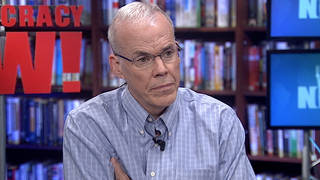
Guests
- Bill McKibbenauthor, longtime environmental activist and founder of 350.org. His latest book is Eaarth: Making a Life on a Tough New Planet.
At this week’s Power Shift 2011 conference in Washington, D.C., longtime environmental activist Bill McKibben critiqued how the United States has failed to take steps to address climate change. He is the founder of the environmental organization 350.org—the name references the 350 parts per million many scientists say is the safe limit for carbon dioxide in the atmosphere. “Think about our own country — historically, the biggest source of carbon emissions. Last summer, the Senate refused to even take a vote on the tepid, moderate, tame climate bill that was before it,” says McKibben. “Last week, the House voted 248 to 174 to pass a resolution saying global warming wasn’t real.” [includes rush transcript]
Transcript
AMY GOODMAN: We end with Bill McKibben, founder of 350.org. He addressed the young climate activists Saturday night at the Power Shift 2011 conference here in D.C. His latest book is called Eaarth: Making a Life on a Tough New Planet.
BILL MCKIBBEN: The science is the easy part of this. Grim, but easy. 2010 was the warmest year on record, and it was warm. We were on the phone one day with our 350 crew in Pakistan, and one of them said, “It’s hot here today.” And I was surprised to hear him say it, because it’s usually hot in Pakistan in the summer. And he said, “No, it’s really hot. We just set the new all-time Asia temperature record, 129 degrees.” That kind of heat melts the Arctic. That kind of heat causes drought so deep across Russia that the Kremlin stops all grain export. That kind of heat causes the flooding that still has four million people across Pakistan homeless tonight.
But if the scientific — if the scientific method has worked splendidly to outline our dilemma, that’s how badly the political method has worked to solve it. Think about our own country — historically, the biggest source of carbon emissions. Last summer, the Senate refused to even take a vote on the tepid, moderate, tame climate bill that was before it. Last week, the House voted 248 to 174 to pass a resolution saying global warming wasn’t real. It was one of the most embarrassing votes that Congress has ever taken. They believe — they believe that because they can amend the tax laws, they can amend the laws of nature, too. But they can’t. I’m awful glad a few of you went up to the visitors’ gallery to talk some sense to them last week.
Even the White House — two weeks ago, the Interior Secretary, who spoke here two years ago, Ken Salazar, signed a piece of paper opening 750 million tons of coal under federal land in Wyoming to mining. That’s like opening 300 new coal-fired power plants and running them for a year. That’s a disgrace.
You know what? At Copenhagen, we got 117 nations to sign on to that 350 target. That was good, but they were the wrong 117 nations. They were poorest and most vulnerable nations. The most addicted nations, led by our own, weren’t yet willing to bite the bullet. So that’s where we’ve got to go to work.
AMY GOODMAN: Bill McKibben, author of Eaarth: Making a Life on a Tough New Planet, and founder of 350.org. 350 is the parts per million many scientists say is the upper limit for carbon dioxide in the atmosphere. We’re now at 391.












Media Options